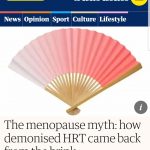Hi All,
This is a quick update for those ladies who are on Everol Patches and have had difficulty obtaining their usual patches.
I receive lots of messages from desperate women who have taken the decision to start HRT and for the first time in years feel good then only to find the rug being pulled out from under them.
If you cannot get your patches then it is worth asking your GP for a close alternative such as Estrodot (oestrogen patch) or Oestrogel gel. And if you are on a combined patch then having your progesterone in tablet form along with the above is a good alternative. This advice has been given by Dr Harper menopasue specialist.
VLOG ON HRT THE PRO’S & CON’S WITH MYSELF AND DR HARPER
Before I post the update from the manufacture please see my vlog that I recorded with Dr Shazadi Harper menopause specialist last month; where we talk about the alternatives and HRT in general. http:https://www.youtube.com/watch?v=k0t3v_IOSoU&t=45s
alternatives and HRT in general. http:https://www.youtube.com/watch?v=k0t3v_IOSoU&t=45s
The menopause myth: how demonised HRT came back from the brink
 We need to normalise menopause, not be shamed by it. And women need to cast off their fear about treatment and feel empowered to seek help
We need to normalise menopause, not be shamed by it. And women need to cast off their fear about treatment and feel empowered to seek help
Hormone replacement therapy is 98% effective for relieving the hot flushes that commonly accompany menopause and yet many women still recoil in horror at the idea of taking it. Photograph: Kellie French/The Guardian
Statistics tell us that ultimately all women who reach a certain age – average 51 – will hit menopause. Of these, 75% will get symptoms from the well-known hot flushes to others like weight gain, low libido, mood swings, insomnia, aches and pains and a whole delightful suite of vaginal and urinary symptoms like burning, pain and incontinence.
If I mention hormone replacement therapy (HRT) to my patients as a way out, many recoil in horror. They suspect I might be trying to give them breast cancer. “It’s not that bad,” they often say. “I don’t want to put hormones in my body.” They’d rather sacrifice their sleep, comfort, sex lives and minds rather than take the “poison apple” offered by their doctor when we know that when given to the right women, HRT is 98% effective for relieving at least the hot flushes … Seriously?‘It feels impossible to beat’: how I was floored by menopause
It all started in 1942 when US pharmaceutical company Wyeth announced it was releasing an oestrogen pill of conjugated equine oestrogen (CEE) called Premarin. This was seen as a saviour for newly emancipated women hoping to stay younger and healthier. Apart from relieving women of their menopause symptoms, studies showed that HRT helped prevent osteoporosis and heart disease in postmenopausal women. It was endorsed by the American Heart Association, the American College of Physicians and the American College of Obstetricians and Gynaecologists. Little wonder that by 1992 Premarin was the top-selling drug in the US.
With drug company marketing driven by men and their thoughts about menopause we shouldn’t be surprised that the pendulum would swing back and swing hard. The whole HRT story unravelled through a series of events that have left menopausal women back at square one, with far less access to options for their symptoms.
In 2002 everything changed. This was when the enormous US-based Women’s Health Initiative Study (WHI) was abruptly stopped after only 5.6 years, with enormous media attention. The researchers had apparently found an increase in breast cancer (and heart disease) with combination HRT (oestrogen plus progestogen). The horrific way the study and these findings were reported changed everything.
To understand this, bear with me while I explain the study. The massive WHI was designed to find out whether older women who started on HRT (specifically a form of oestrogen and progesterone no longer used by doctors because there are more effective and safer forms out there today) after menopause (ie not for its intended purpose of managing menopausal symptoms) would enjoy the same heart-health benefits as younger women who started taking it during peak menopause symptoms. Essentially the study was trying to find out whether the known health benefits of HRT meant you’re “never too old” to start. So the WHI study intentionally didn’t include many recently menopausal women. Because doctors already knew about the health benefits to them, didn’t we? The average age of the women in the study starting on HRT in the WHI was 63. But 25% of them were over 70 when they started their HRT. The women randomised to get HRT (versus placebo) were older. In fact two-thirds of the HRT recipients were between 60 and 79 years.
Indeed the study did show that for these older women there was a 26% increase in the risk of breast cancer among women on this old-school form of HRT compared with placebo. That translated to 38 women per 10,000 per year in the women on HRT, compared with 30 women per 10,000 in the women on placebo. Even in this study, the risk of breast cancer from using HRT was only slightly higher than the risk (found by the same study) of drinking one glass of wine a night, but less than the risk of drinking two glasses of wine a night.
The risk of breast cancer from taking HRT in these older women was similar to the risk reported with obesity and low physical activity.
Ultimately the study concluded that HRT shouldn’t be given to every single woman only to prevent heart disease. Especially older women without any menopause symptoms.
As a postscript, late analysis of WHI data shows that if you look only at women between the ages of 50 and 59, when most women use it and need it, there are clear benefits of HRT. These women had fewer cancers, fractures and deaths from any cause compared with the women taking placebo. Pretty ironic.
Know the risks about HRT and breast cancer. But don’t panic about them
And yet the result was widespread panic. Women (80% of users) threw their HRT prescriptions in the bin; many felt sick to discover that what had been prescribed by their doctor to keep them healthy was supposedly “deadly”. Doctors refused to prescribe HRT, telling women to put up with their hot flushes. And the belief that HRT is deadly, stuck.
Governments joined the chorus of doomsday warriors. Governments in Australia, US and UK immediately issued new guidelines, stating that the only reason women and their doctors should consider HRT would be for treatment of “moderate to severe” hot flushes or significant risk of osteoporosis fracture. And then HRT should be used at the lowest possible dose and for the shortest amount of time.
These black box warnings are still there today. The drug companies were pummelled into submission. Wyeth faced thousands of lawsuits over its HRT formulations. The company ended up being sold to Pfizer in 2009; rumour has it they have agreed to pay $US330m as a lump sum to resolve the claims.
Finally, doctors caved too. There is now a generation of GPs, endocrinologists and even gynaecologists left too scared to prescribe HRT, and now ultimately without the knowledge, confidence and experience to do so.
But change is coming, with social movements empowering women to demand access to a great menopause. Led by celebrities such as Kim Cattrall, Emma Thompson, Mariella Fostrup (who recently spoke out on the HRT shortages) Angelina Jolie, Yasmin Le Bon, Jean Kittson and Davina McCall, Mariella women are starting to come out as menopausal (as if we didn’t know a woman approaching 60 might have gone through a bit of a change). 
Women of menopausal age are a powerful consumer group. What they want matters. They’re not going to sit around sweating or throwing away their sex lives without demanding access to treatment. They’re growing in confidence too. I’ve also noticed that as women make up a larger percentage of GPs and gynaecologists, and as more and more women doctors reach an age (like me!) when this is all incredibly relevant, and as peak bodies try to change opinion about HRT, finally the message is getting through and things are changing. We’re seeing a bit of a resurgence of GPs and even gynaecologists prepared to prescribe HRT for their patients and doing it really well.
Quote from Dr Ginni Mansberg.
We need to normalise menopause, not be shamed about it. And we women need to cast off our fear and feel empowered to seek the help we deserve for this important phase of our lives. I’m certainly not saying every woman needs HRT. Many, many really don’t have any symptoms, let alone significant ones. But into the mix of options available to women, HRT should be presented in a factual way minus the fearmongering.
HRT UPDATE
Here is the update from Theramex the manufacture’s
Evorel: UK Stock Update from Theramex
20th January 2020
Theramex acquired the Evorel family of products from Janssen Pharmaceutical Companies of
Johnson & Johnson on 23rd October 2019 at which point many individual products were out of stock.
We have since been committed to resolving this issue and bringing the product back to patients. To
do so we have:
1. Re-started manufacturing and increased output
2. Qualified and invested in an additional manufacturer to accelerate supply
3. Invested in additional packaging equipment to increase production volumes and improve speed
to market
4. Worked in partnership with the UK Health Authorities to shorten timelines
As a result, we have been able to fast-track supply, shorten manufacturing timelines and are pleased
to say that we are bringing the product back to market, more than 6 months earlier than originally
planned.
Below the most up to date stock availability dates:
Evorel Mono 50 14th February 2020
Evorel Conti 21st February 2020
Evorel Mono 25 March 2020
Evorel Mono 75 March 2020
Evorel Mono 100 March 2020
Evorel Sequi End March 2020
As we bring Evorel back to market over the coming months, we will continue to build on stock levels
across all lines to restock the market fully. We appreciate your patience with this.
We will continue to provide regular updates on stock availability on our website and to UK Health
Authorities.
We appreciate the impact this has had on women‘s lives and thank you for your understanding. We
continue working towards a continuous and stable supply chain.
Further information
For patients with questions regarding current or alternative HRT therapies, please speak to your GP
or healthcare professional.
For pharmacists and healthcare professionals who require further information around supply of the
Evorel range of products please contact your usual wholesale providers.
I hope you found this blog helpful….
Meno Hugs
Jane x

